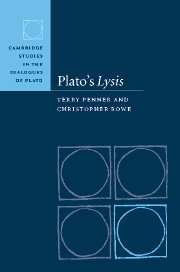Book contents
- Frontmatter
- Contents
- Preface
- PART I AN ANALYSIS OF THE LYSIS
- 1 203a1–207b7: the cast assembles, and the main conversation is set up
- 2 207b8–210d8 (Socrates and Lysis): do Lysis' parents really love him?
- 3 210e1–213c9: Socrates and Menexenus – how does one get a friend?
- 4 213d1–216b9: Socrates and Lysis again, then Menexenus – poets and cosmologists on what is friend of what (like of like; or opposite of opposite?)
- 5 216c1–221d6: what it is that loves, what it really loves, and why
- 6 221d6–222b2: the main argument reaches its conclusion
- 7 222b3–e7: some further questions from Socrates about the argument, leading to (apparent) impasse
- 8 223a1–b8: the dialogue ends – people will say that Socrates and the boys think they are friends, but that they haven't been able to discover what ‘the friend’ is
- 9 203a1–207b7 revisited
- PART II THE THEORY OF THE LYSIS
- Epilogue
- Translation of the Lysis
- Bibliography
- Index of names
- Index of subjects
7 - 222b3–e7: some further questions from Socrates about the argument, leading to (apparent) impasse
Published online by Cambridge University Press: 22 September 2009
- Frontmatter
- Contents
- Preface
- PART I AN ANALYSIS OF THE LYSIS
- 1 203a1–207b7: the cast assembles, and the main conversation is set up
- 2 207b8–210d8 (Socrates and Lysis): do Lysis' parents really love him?
- 3 210e1–213c9: Socrates and Menexenus – how does one get a friend?
- 4 213d1–216b9: Socrates and Lysis again, then Menexenus – poets and cosmologists on what is friend of what (like of like; or opposite of opposite?)
- 5 216c1–221d6: what it is that loves, what it really loves, and why
- 6 221d6–222b2: the main argument reaches its conclusion
- 7 222b3–e7: some further questions from Socrates about the argument, leading to (apparent) impasse
- 8 223a1–b8: the dialogue ends – people will say that Socrates and the boys think they are friends, but that they haven't been able to discover what ‘the friend’ is
- 9 203a1–207b7 revisited
- PART II THE THEORY OF THE LYSIS
- Epilogue
- Translation of the Lysis
- Bibliography
- Index of names
- Index of subjects
Summary
Socrates' desire to ‘take a look at the argument’ (222b3) expresses itself in a very particular form. He has two questions to put to Lysis and Menexenus:
And I said, wanting to take a look at the argument (logos), ‘If belonging (to oikeion) is different from being like (to homoion), then we'd be saying something worth saying, so 222b5 it seems to me, Lysis and Menexenus, about what a friend (philos/philon) is; but if it's actually the case that they're the same thing, like (homoion) and belonging (oikeion), it's not easy to discard our previous argument (logos) to the effect that like was useless to like with respect to their likeness, and to concede that what is useless 222c1 is a friend (philon) strikes a false note. So are you prepared,’ I said, ‘since we're intoxicated with our argument, that we should agree to say that belonging is something different from being like?’
‘Yes, absolutely.’
‘Shall we then also lay it down that the good belongs [is oikeion] to everyone, and the bad is 222c5 alien [allotrion, sc. to everyone]? Or [shall we lay it down] that the bad belongs to the bad, to the good the good, and to the neither good nor bad the neither good nor bad?’
They both said it seemed to them like this, that each 222d1 belongs to each.
(222b3–d1)- Type
- Chapter
- Information
- Plato's Lysis , pp. 173 - 184Publisher: Cambridge University PressPrint publication year: 2005



